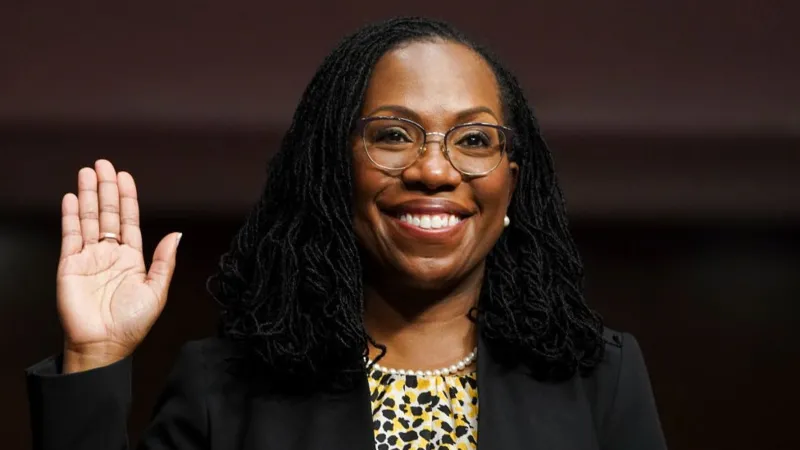Ketanji Brown Jackson made history this Thursday.
With 53 votes in favor, the 51-year-old jurist became the first African-American woman to be appointed to the United States Supreme Court .
Democrats and three Republicans in the Senate voted in favor of her appointment after US President Joe Biden nominated her last February to replace Judge Stephen Breyer , who announced her retirement.
“On this vote, the ‘yeses’ are 53, the ‘noes’ are 47. And this nomination is confirmed,” said US Vice President Kamala Harris, who assumed her role as Senate president in the session.
The Democratic majority applauded and cheered the result. Chuck Schumer, the Majority Leader, called it a “joyful day” for America.
Alaska Sen. Lisa Murkowski, one of three Republicans who voted for Judge Jackson, said her decision was, in part, a sign of “rejection of the corrosive politicization” surrounding the confirmation process.
The new justice “will bring to the Supreme Court courtroom experience that few can match given her litigation record,” Murkowski added.
In the 233-year history of the Supreme Court, she is the third person from the black community to sit on the highest court in the country, after Justices Thurgood Marshall (who died in 1993) and Clarence Thomas (currently in office).
With the arrival of Jackson, the composition of the Supreme Court – key in many decisions in the country – will remain with a representation of six conservative judges and three progressives, including Jackson among the latter.
The origin of Ketanji Brown Jackson
In nominating her to the Supreme Court, President Biden called Jackson “one of the brightest legal minds in the nation . “Her career is wide.
Born in Washington DC in 1970, she grew up in Miami in the years when there were still effects of racial segregation in the southeast of the country.
“My parents taught me that despite the many barriers I faced growing up, if I worked hard and believed in myself and America, I could do anything or be anything I wanted to be,” says Jackson.
“It was my father who started me on this path. When I was a child, I saw him study and he became my first professional role model.”
In high school she was a debate champion and class president.
Jackson has two degrees from Harvard University, an institution she entered with only three other African-American classmates.
“In those early moments of wondering if you belong, she was the anchor. Then she made sure we all were. She’s the one who became the foundation for all of us,” says former partner Lisa Fairfax.
Around this time she met her husband, Patrick Jackson , who was a Columbia medical student from a white Boston family.
Her career
Jackson currently sits on the influential US Court of Appeals for the DC Circuit.
She was previously in public defense, making her the first Supreme Court justice to have been a public defender before the courts.
In 2012, then-President Barack Obama nominated Jackson as a DC District Court Judge. During the eight years she spent there she wrote more than 500 opinions.
Among them, it ruled that Donald F McGhan II, President Donald Trump’s former White House lawyer, had to testify in the investigation into Russian meddling in the US election.
Upon being nominated, Justice Jackson spoke of her family and her legal mentors and role models.
She said that while clerking for Judge Breyer (for whom she replaces) from 1999-2000, she learned what was required for that position: “the highest level of skill and integrity, civility and grace . ”
Justice Jackson also spoke briefly about her approach to the law: “I have been a judge for almost a decade and I take that responsibility and my duty to be independent very seriously.”
“I decide cases from a neutral position. I evaluate the facts, interpret and apply the law to the facts of the case before me, without fear or favor, in accordance with my judicial oath.”
But, during the 30 hours of confirmation hearings , many Republicans felt there were flaws in her past decisions.
They criticized her for not answering whether seats should be added to the Supreme Court (something Republicans reject) and for not wanting to define the term “woman.” She was also charged with leniency in child pornography cases.
However, Democrats said she has “full credentials” for the top job to which she was confirmed.
Controversial cases
Some of the decisions in her judicial career were reviewed at confirmation hearings.
Senator Dick Durbin referred to allegations that she “has a pattern of letting child pornography offenders go free.”
She was noted for giving “lenient” sentences to defendants and advocating for reduced sentences when she was vice chair of the US Sentencing Commission, which advises Congress on federal sentencing guidelines.
The claims are misleading, according to various fact-checking sites.
“Nothing could be further from the truth,” said Jackson, who dodged criticism of her sentences that were at times below guidelines issued by Congress, but not unlike those of other judges.
She chose to speak of the harm caused by sex offenders and the lives that had been shattered. She described the range of punishments defendants received through their failures.
Another of her questionable moments was having been a public defender of Guantánamo detainees .
Republicans criticized that she had provided “free legal services to help terrorists get out” of the military prison.
The judge said that public defenders are assigned cases and do not choose whom to represent, and that all defendants have a “right to representation and to be treated fairly” under the US justice system.
But she acknowledged that defending detainees sometimes meant helping free people who were later against US interests.

